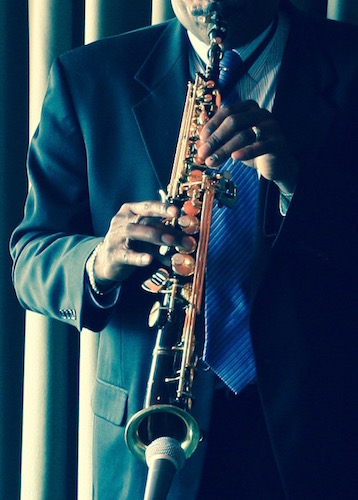I walk onto a stage and into a cone of light. Musicians are behind me. I can only hear, not see them. The music plays, softly at first. I listen, waiting for my cue. I start to sing. My voice is strong and steady. It’s like fine chocolate and good wine. I hear my voice reverberating off the walls and the finely-tuned sound system. I belt out one song, and one song only. The audience goes wild.
And then . . . I wake up. I wish I could sing or play an instrument or do something to make an audience scream for more like Streisand or Tina Turner or Beyonce. No such luck.
I love music. It’s been a part of my life ever since I can remember. Not in a conventional way, but it was there just the same. My mother had, what I now understand, was a great and very eclectic music collection. It was in my home that I learned about Jimmy Smith’s organ, Sarah Vaughn’s silky voice, Johnny Mathis’ dreamy crooning, and Bach’s Violin Concertos.
There’s a link in my family connecting three generations of music lovers, specifically, with the saxophone. My mother loves saxophone music. I love saxophone music and my son plays the saxophone. Who’s to say if or how that admiration passed from one of us to another, but it exists.
I think of the saxophone as sultry and provocative. Not the player as much as the music. I resisted my attraction to the instrument for a long time, because I was exposed to jazz that I’ll amateurishly label atonal. The kind that a musician would play, beating the rhythm out in frenetic notes, his fingers blasting up and down the keypad. The kind where the head of every listener in a jazz club would bob up and down as if the music was a minister’s Sunday morning sermon (and sometimes it was). I just didn’t get it.
The good news is that now I do.
But it’s not just the saxophone that inspires me. Music appears in both of my novels.
In Searching for Tina Turner, Lena, the main character is inspired by Tina Turner to make changes in her life. She listens to Tina’s music (after Ike) in search of the lessons hidden in the lyrics and rhythm and in the beat that takes her mind off of the difficult decision she has to make. Tina’s lyrics help Lena to understand that she is not alone in losing her dream and that there is a good future ahead for her.
Okay, I confess that I loaded my iPod with Tina Turner music to find a beat that would translate to my writing. When Lena hopped around her living room, I danced around mine seeking that feeling of joy that would help me to move Lena forward in her journey.
I knew that someday I had to get back to the saxophone. That was when Arnett came alive. In Passing Love, Ruby Mae Garrett falls for a good-looking, Louisiana sax player. who eventually takes her to Paris. Ruby’s friend warns her, “… a saxophone played right is as close as a person can get to God.” I heard Arnett playing in my head that kind of music “caught between blues and jazz and a style of music with no name.”
The music overtook me. His music overtook me and sealed Ruby’s fate.
My iPod is filled with all kinds of music—from Brazil and Cuba, jazz (lots of Coltrane), classical, blues, easy listening, opera, and more. As I sit here writing, I realize how much I depend on music. It penetrates (and stimulates) the emotions I’m trying to inject into my story and my characters.
And then there are the times that I try to fulfill that dream, and I pretend to be on stage, the music booming behind me. I sing my heart out knowing good and well that I am (and will always be) my own, and only, audience.
That done, I return to my computer, and write.
(This blog was originally written for Colloquium, but I liked it so much I decided to include it here.)


